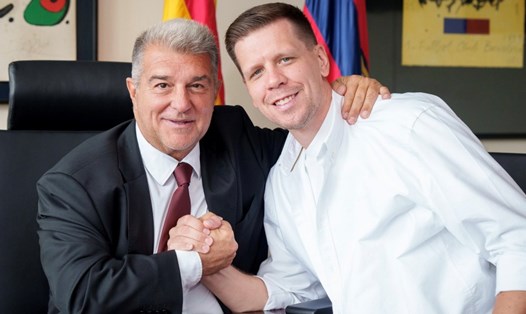Statue in Albacete
When talking about Andres Iniesta, people often think of FC Barcelona and the Spanish National Team, thinking that he is from Catalonia. But that is not true, Iniesta comes from Fuentealbilla - a small village in the province of Albacete, Castile-La Mancha, Spain. This place is located in the northeast of the city of Albacete. And Iniesta did not start with regular football but played futsal, due to the lack of football fields in the village.
With a successful career, Iniesta's reputation and achievements have spread pride in Albacete. But not only bringing fame from football, Iniesta also has great contributions to his hometown, such as investing and developing grape growing and wine production projects. Not only that, he also lent money to his old team to pay players' salaries, avoiding relegation to the Fourth Division (this happened in 2013).
Barcelona was not Iniesta's first club, but Albacete. At the age of 12, while playing for Albacete Balompie in a 7-a-side youth tournament in Albacete, Iniesta attracted the attention of scouts from clubs across Spain. His parents knew Barcelona's youth coach, Enrique Orizaola, and he convinced them to consider sending Iniesta to Barcelona's youth academy.
Iniesta went there with his parents and visited La Masia, the club's youth academy; the trip convinced them to enroll Iniesta in Barcelona's youth system. Iniesta's career took off from there, but he never forgot Albacete and Albacete never forgot him.
Last June, coinciding with the Spanish Sports Press Association's 43rd National Sports Gala in Albacete, the Soliss Foundation unveiled a statue near the Carlos Belmonte stadium dedicated to Iniesta, one of the greatest athletes of all time and a proud ambassador for the city.
The sculpture, created by renowned artist Javier Moreno, was inspired by the famous man from La Mancha’s goal in the 2010 World Cup final against the Netherlands in South Africa. It was a goal that has been described as the most important in Spanish football history – the first and only world championship to date. Iniesta became not only a national hero but also a symbol of unity, someone who could unite an entire country with just one kick of the ball.
Number 8 infinity
It is not without reason that Iniesta chose October 8 as the date to officially announce his retirement. Because the number 8 on the back of his shirt is closely associated with his career (only in the Spanish national team shirt does he wear number 6, changing the number 8 shirt to Xavi Hernandez). There is an interesting thing about the number 8: when it is vertical, it is a simple number 8, but when placed horizontally, it is the sign of the infinity symbol.
When Iniesta left Barcelona in 2018, the Camp Nou team acted in such a way to show their gratitude with the message: Iniesta - Infinit8 (infinite number 8). Perhaps, the Spanish midfielder's career did not include any Golden Ball (France Football magazine wrote an apology for still owing him a Golden Ball), or perhaps because he was unfortunately in the same era as Cristiano Ronaldo and Lionel Messi, brilliant enough not to win individual awards, but his value is in another aspect. More quietly, but his contributions are endless and immortal.
Not only Barcelona and the Spanish National Team, he also brought those values to Japan (in Vissel Kobe shirt) for 5 years or even a very short period in the UAE (Emirates Club) until the age of 40...
It is said that watching Iniesta play football is a privilege. That privilege is even greater when he is surrounded by Xavi, Messi, Sergio Busquets, creating one of the most worth-watching football periods in history. And without needing awards, just listening to the great names of world football - whether teammates, coaches or opponents, people can see the admiration and respect for a man who always plays football with the humility of a child on the street and the magic of a master on the field.
From the first time he saw Iniesta, Pep Guardiola told Xavi, “This kid will make us retire.” To him, Iniesta is not just a player but an artist because “football will remember him in 50 years.”
Messi likes the straightforwardness that makes Iniesta so beloved; Xavi calls his former teammate a role model for others and the embodiment of a team player; Neymar insists that “there will never be another player like Iniesta”, Gianluigi Buffon compares him to a “magician” who plays to a different rhythm, winning everyone’s respect through simplicity and elegance; Sergio Ramos jokes in earnest that “if Iniesta were called Andresinho, he would have two Ballons d’Or”; Zinedine Zidane is more direct with the assertion “I will give him the Ballon d’Or”…
Next journey
The last person to appear in the video of Iniesta announcing his retirement was Jose Antonio Iniesta - Andres' father, with the comment that, "I don't think Andres can really leave football". He was right, the 40-year-old former midfielder will aim for a new role in football - as a coach, to one day appear in the technical area of Barcelona, of the Spanish National Team or anywhere else. And so, the magic and wonders from Iniesta's mind are still shown...
And now, Andres is more than just a footballer for his people. The magic he radiated on the pitch, his perfect integration into Catalan society and his style of play are in perfect harmony with the respect for his roots that he has always cherished. Farewell to a football wizard who has made millions dream and will surely remain a beautiful reference for generations to come.






